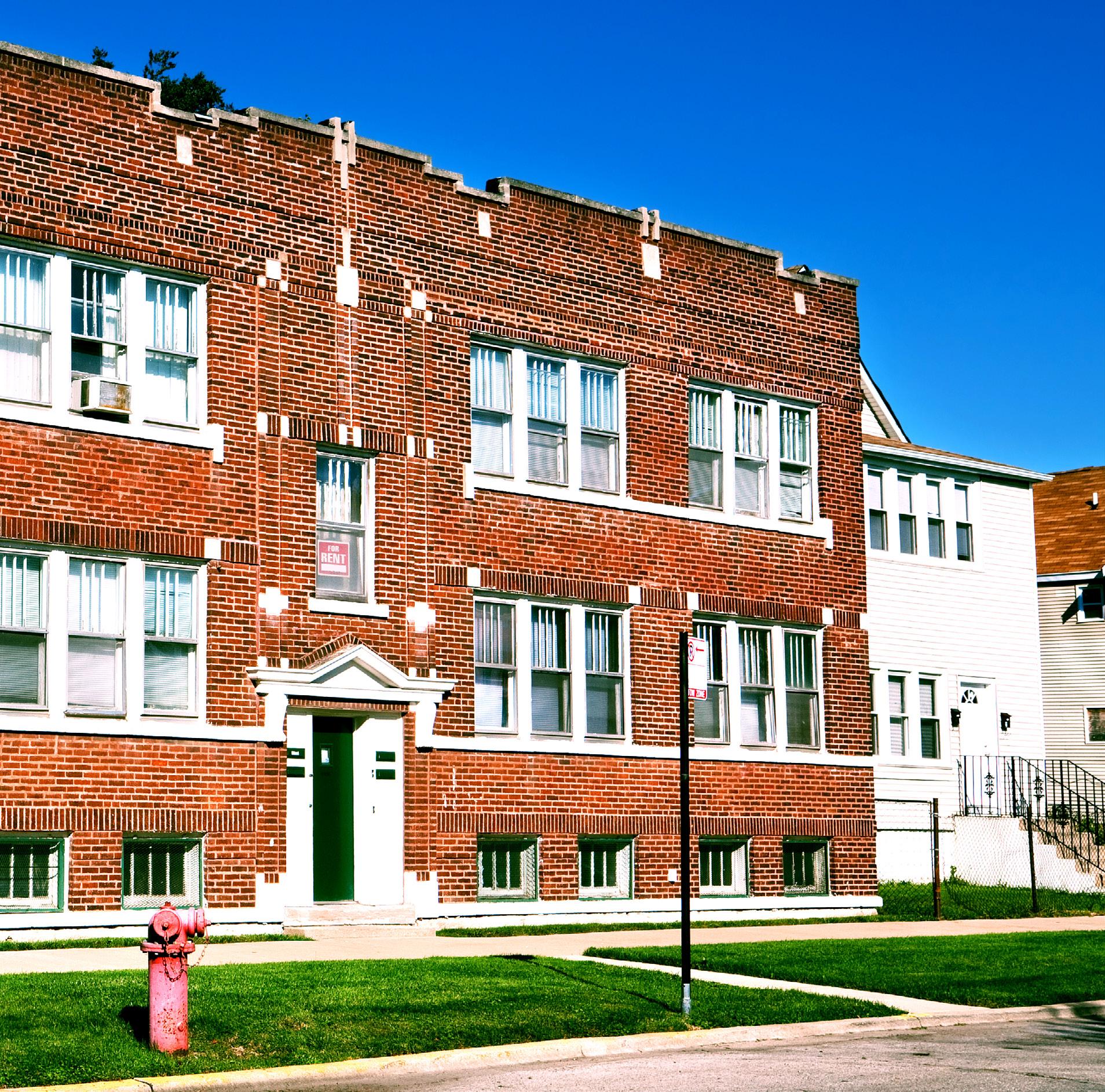
9 minute read
Ordinances, renter’s rights and more
assistance for renters
Programs are limited to funding availability. Applicants must meet all eligibility requirements. renters
Advertisement
chicago.gov/rlto
Lori E. Lightfoot Mayor of Chicago CITY OF CHICAGO RESIDENTIAL LANDLORD AND TENANT ORDINANCE SUMMARY DOH Department of Housing
At initial offering, this Summary of the ordinance must be attached to every written rental renewal.
The Summary must also be given to a tenant at initial offering of an oral agreement, renewal. Unless otherwise noted, all provisions are effective as of November 6, 1986.
Lori E. Lightfoot Mayor of Chicago
The Residential Landlord and Tenant Ordinance sets out the legal rights and responsibilities of both landlords and tenants for most rental properties. Adopted in 1986 and amended over the years, the ordinance covers key issues such as security deposits, landlord’s right of access, tenant’s responsibilities, and landlord/tenant remedies. It also requires that a summary copy of the RLTO be given to prospective tenants by the landlord and attached to each written lease agreement and lease renewal. Fair Notice Ordinance
At initial offering, this Summary of the ordinance must be attached to every written rental agreement and also upon initial offering renewal. The Summary must also be given to a tenant at initial offering of an oral agreement, whether the agreement is new or a renewal. Unless otherwise noted, all provisions are effective as of November 6, 1986. {Mun. Code Ch. 5-12-170} for
IMPORTANT: IF YOU SEEK TO EXERCISE RIGHTS UNDER THE ORDINANCE, OBTAIN A COPY OF THE ENTIRE ORDINANCE TO DETERMINE APPROPRIATE REMEDIES AND PROCEDURES. CONSULTING AN ATTORNEY WOULD ALSO BE ADVISABLE. FOR A COPY OF THE ORDINANCE, VISIT THE CITY CLERK’S OFFICE ROOM 107, CITY HALL, 121 N. LASALLE, CHICAGO, ILLINOIS.
I MPORTANT NOTICE Chicago Rents RightGood Tenants, Good Landlords, Great Neighborhoods!For more information, please call 312-742-RENT (7368) A message about porch safety: The porch or deck of this building should be designed for a live load of up to 100 lbs. per square foot, and is safe only for its intended use. Protect your safety. Do not overload the porch or deck. If you have questions about porch or deck safety, call the City of Chicago non-emergency number, 3-1-1. WHAT RENTAL UNITS ARE COVERED BY THE ORDINANCE? {MUN. CODE CH. 5-12-010 & 5-12-020}• Rental units with written or oral leases (including all subsidized units such as CHA, IHDA, Section 8 Housing Choice Vouchers, etc.)EXCEPT • Units in owner occupied buildings with six or fewer units.• Units in hotels, motels, rooming houses, unless rent is paid on a monthly basis and unit is occupied for more than 32 days.• School dormitory rooms, shelters, employee’s quarters, non-residential rental properties.• Owner occupied co-ops and condominiums. WHAT ARE THE TENANT’S GENERAL DUTIES UNDER THE ORDINANCE? {MUN. CODE CH. 5-12-040}The tenant, the tenant’s family and invited guests must comply with all obligations imposed specifically upon tenants by Municipal Code, applicable to dwelling units, including section 7-28-859:• Buying and installing working batteries in smoke and carbon monoxide detectors within tenant’s apartment.• Keeping the unit safe and clean. provision of the • • • Using all equipment and facilities in a reasonable Not deliberately or negligently damaging the unit.Not disturbing other residents. manner. LANDLORD’S RIGHT OF ACCESS {MUN. CODE CH. 5-12-050}• A tenant shall permit reasonable access to a landlord upon receiving two days notice by mail, telephone, written notice or other means designed in good faith to provide notice. • A general notice to all affected tenants may be given in the event repair work on common areas or other units may require such access. • In the event of emergency or where repairs elsewhere unexpectedly require access, the landlord must provide notice within two days after entry. SECURITY DEPOSITS AND PREPAID RENT {MUN. CODE CH. 5-12-080 AND 5-12-081}• A landlord must give a tenant a receipt for a security deposit including the owner’s name, the date it was received and a description of the dwelling unit. The receipt must be signed by the person accepting the security deposit.• However, if the security deposit is paid by means of an electronic funds transfer, the landlord has the option to give an electronic receipt. The electronic receipt must describe the dwelling unit, state the amount and date of the deposit, and have an electronic or digital signature. (eff. 10-8-10) • However, the landlord may accept the payment of the first month’s rent and the security deposit in one check or one electronic funds transfer and deposit such rent and security deposit into one account, if the landlord within 5 days of such acceptance transfers the security deposit into a separate account. (eff. 10-8-10) • A landlord must hold all security deposits in a federally insured interest-bearing account in a financial institution located in Illinois. Security deposits and interest thereon shall not be commingled with the assets of the landlord.• A written rental agreement must specify the financial institution where the security deposit will be deposited. If there is no written rental agreement, the landlord must in writing provide such information to the tenant within 14 days of the receipt of the security deposit. If the security deposit is transferred to another financial institution, the landlord must notify the tenant within 14 days of the transfer the name and address of the new financial institution. (eff. 10-8-10)
I MPORTANT NOTICE A message about porch safety: The porch or deck of this building should be designed safe only for its intended use. Protect your safety. Do not overload the porch or deck. for a
If you
City of Chicago non-emergency number, 3-1-1. WHAT RENTAL UNITS ARE COVERED BY THE ORDINANCE? {MUN. CODE CH. • Rental units with written or oral leases (including all subsidized units such as CHA, IHDA, EXCEPT •
• • • Units in owner occupied buildings with six or fewer units. Units in hotels, motels, rooming houses, unless rent is paid on a monthly basis and unit is School dormitory rooms, shelters, employee’s quarters, non-residential rental properties. Owner occupied co-ops and condominiums. WHAT ARE THE TENANT’S GENERAL DUTIES UNDER {MUN. The tenant, the tenant’s family and invited guests must comply with all obligations imposed Municipal Code, applicable to dwelling units, including section 7-28-859: • Buying and installing working batteries in smoke and carbon monoxide detectors within • • • Keeping the unit safe and clean. Using all equipment and facilities in a reasonable manner. Not deliberately or negligently damaging the unit. • Not disturbing other residents.
LANDLORD’S RIGHT OF ACCESS {MUN. CODE CH. 5-12-050} • A tenant shall permit reasonable access to a landlord upon receiving two days notice by in good faith to provide notice. • A general notice to all affected tenants may be given in the event repair work on common • In the event of emergency or where repairs elsewhere unexpectedly require access, the entry.
SECURITY DEPOSITS AND PREPAID RENT {MUN. CODE CH. 5-12-080 AND 5-12-081} • A landlord must give a tenant a receipt for a security deposit including the owner’s name,
dwelling unit. The receipt must be signed by the person accepting the security deposit.
However, if the security deposit is paid by means of an electronic receipt must describe the dwelling unit, state electronic funds transfer, the landlord the amount and date of the deposit, 10-8-10) •
However, the landlord may accept the payment of the first month’s rent and the security
and deposit such rent and security deposit into one account, if the landlord within 5 days separate account. (eff. 10-8-10) •
A landlord must hold all security deposits in a federally insured interest-bearing account
deposits and interest thereon shall not be commingled with the assets of the landlord. •
A written rental agreement must specify the financial institution where the security deposit
ment, the landlord must in writing provide such information to the tenant within
14 days deposit is transferred to another financial institution, the landlord must notify the tenant the new financial institution. (eff. 10-8-10)
IMPORTANT: IF YOU SEEK TO EXERCISE RIGHTS UNDER THE ORDINANCE,
ORDINANCE TO DETERMINE APPROPRIATE REMEDIES AND PROCEDURES.
ALSO BE ADVISABLE. FOR A COPY OF THE CITY CLERK’S
121 N. LASALLE, CHICAGO, ILLINOIS.
Chicago Rents Right Good Tenants, Good Landlords, Great Neighborhoods! For more information, please call 312-742-RENT (7368)
chicago.gov/fairnotice
The Fair Notice Ordinance was approved by the Chicago City Council in July 2020 and creates new rights and responsibilities for tenants and landlords to give Chicago renters more stability in their homes. Most importantly, the ordinance increases the amount of notice a landlord must give in order to non-renew or terminate a lease, or to raise a tenant’s rent. The ordinance also extends the amount of time during which a tenant may end an eviction filing against them by paying the rent they owe and their landlord’s court filing fees. If your landlord moves to terminate your lease or raise your rent they must provide:
• 60 days notice if you’ve lived in your apartment between 6 months and 3 years. • 120 days notice if you’ve lived in your apartment more than 3 years.
Affordable Rental Housing Resource List
chicago.gov/AFRentResourceList
This list of affordable rental housing opportunities has been supported and developed through the City of Chicago to assist and guide individuals looking for affordable rental housing throughout the city. The Department of Housing remains committed to making our neighborhoods strong, safe and affordable for all Chicagoans.
Chicago Low-Income Housing Trust Fund
clihtf.org
To meet the permanent housing needs of Chicago’s very low-income residents. Chicago Low-Income Housing Trust Fund assists residents living in poverty (incomes not exceeding 30 percent of area median income) by providing secure, safe, sound and affordable housing. The Trust Fund serves Chicago’s low-income working households, the disabled, the elderly, and countless homeless individuals and families.
312-742-RENT (312-742-7368)
The Chicago Department of Housing, in partnership with tenant and landlord organizations, has formed the Renters’ Rights hotline to educate Chicagoans about the legal responsibilities and rights of renters and property owners. The hotline is available 24/7.
Tenants’ Rights Hotline
773-292-4988
The hotline is managed by the Metropolitan Tenants Organization through support from the Chicago Department of Housing. It’s open Monday–Friday, 1:00–5:00pm.

Illegal Lockouts
chicago.gov/eviction
Lockouts are illegal. Affected tenants should call 311 to file a formal police report detailing the lockout incident. A “lockout” has occurred any time a landlord does or threatens to take any of the following actions with regard to a residential tenant’s home or apartment:
• Change or disable the locks • Block any entrance • Remove doors or windows
• Shut off or interfere with utility services, including heat, electricity, gas, hot or cold water, plumbing, and phone service • Remove appliances or fixtures • Remove the tenant’s personal property • Use or threaten violence against the tenant or their property • Any other act making the property inaccessible or uninhabitable
COVID-19 Eviction Protection Notice
chicago.gov/eviction
The COVID-19 Eviction Protection Ordinance requires landlords to make good faith efforts towards resolutions with tenants before moving ahead with an eviction filing, including offering repayment plans and third-party mediation. It requires landlords to wait for a seven-day “cooling-off” period in addition to the regular five-day notice period, when filing evictions against tenants due to nonpayment of rent whearas those tenants have coronavirus-related financial hardships. After the “cooling-off” period, landlords must show the court that they have engaged in good faith efforts to reach a reasonable alternative to eviction, including mediation, payment plans or other options before an eviction can proceed.


